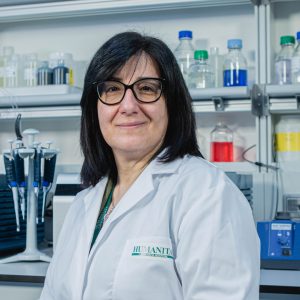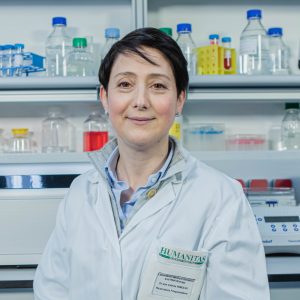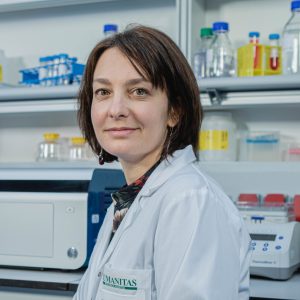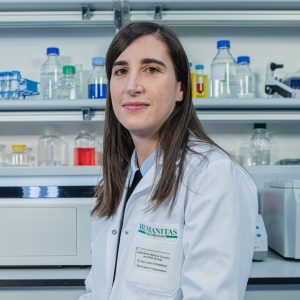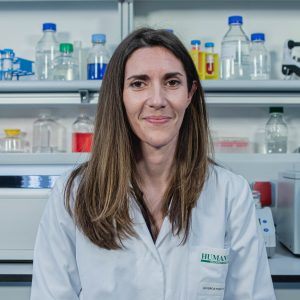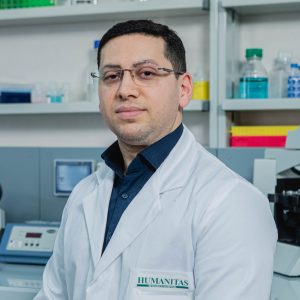Research Group
Asselta Group
Medical Genetics and RNA Biology Lab
Our lab focuses on the role of genetic components, non-coding RNAs molecules and post-transcriptional gene regulation, in Mendelian and multifactorial complex diseases such as Parkinson disease, multiple sclerosis, Primary Biliary Cholangitis, COVID-19 and cancer.
The challenge
Recent advances in sequencing technologies, gene expression analysis and data science opened up new lines of investigation in the pathogenic mechanisms underlying both monogenic diseases and multifactorial complex conditions, which often cluster in families even if they do not have a clear-cut pattern of inheritance. Genome-wide association studies allowed for the identification of different profiles of genetic risk for conditions that are still poorly understood – such as Parkinson diseases or multiple sclerosis – and contributed to unveil the key role played by splicing and back-splicing dysregulation, as well as non-coding RNA molecules, in diseases pathogenesis.
Main research areas
Genetic predisposition to complex diseases
We are interested in understanding the genetic components of the predisposition to complex pathological conditions such as Parkinson diseases, multiple sclerosis, juvenile myocardial infarction – a project conducted in collaboration with the Broad Institute of MIT and Harvard – and Primary Biliary Cholangitis (PBC), a chronic liver disease in which autoimmune destruction of the small intrahepatic bile ducts eventually leads to cirrhosis. We are particularly interested in the characterization of pathogenic mechanisms that interfere with splicing and transcript stability. In the last three years we have also been investigating the genetic predispositions to the severe forms of COVID-19. Our approach to the study of complex traits is often based on genome-wide screens (genome-wide association studies, as well as RNA, exome, and genome sequencing), integrating the diverse omics layers with supervised or unsupervised strategies (including the implementation of artificial intelligence procedures).
Role of non-coding RNAs in the pathogenesis of human diseases
We are interested in investigating the role of miRNAs and of other non-coding RNAs in the pathogenesis of different diseases, such as non-syndromic hearing loss, Parkinson diseases and multiple sclerosis. In these pathological contexts, we try to identify non-coding RNAs that play a role in pathogenesis, to study their expression profile and biogenesis, to predict and experimentally validate their function and interaction with targets. In addition, we are interested in the study of circular RNAs as potential biomarkers.
Novel approaches for the molecular diagnosis of cancer
We are working at the identification of tumor-derived elements in biologic fluids for the early detection and molecular characterization of prostate cancer. We are also collaborating to a radiomics project aimed at combining FDG-PET quantitative analysis with pathology data, somatic mutations, chromosomal rearrangements, patient outcome and therapy response in lung cancer.
Selected publications
A second update on mapping the human genetic architecture of COVID-19.
Genome-wide epistasis study highlights genetic interactions influencing severity of COVID-19.
Detailed stratified GWAS analysis for severe COVID-19 in four European populations.
Reply to: Hultström et al., Genetic determinants of mannose-binding lectin activity predispose to thromboembolic complications in critical COVID-19. Mannose-binding lectin genetics in COVID-19.
Role of Lysosomal Gene Variants in Modulating GBA-Associated Parkinson’s Disease Risk.
Recognition and inhibition of SARS-CoV-2 by humoral innate immunity pattern recognition molecules.
MEDTEC Students against Coronavirus: Investigating the Role of Hemostatic Genes in the Predisposition to COVID-19 Severity.
X Chromosome Contribution to the Genetic Architecture of Primary Biliary Cholangitis.
The SPID-GBA study: Sex distribution, Penetrance, Incidence, and Dementia in GBA-PD.
Genomewide Association Study of Severe Covid-19 with Respiratory Failure.
Saposin D variants are not a common cause of familial Parkinson’s disease among Italians.
ACE2 and TMPRSS2 variants and expression as candidates to sex and country differences in COVID-19 severity in Italy.
Profiling the mutational landscape of coagulation factor V deficiency.
Not only cancer: the long non-coding RNA MALAT1 affects the repertoire of alternatively spliced transcripts and circular RNAs in multiple sclerosis.
The GBAP1 pseudogene acts as a ceRNA for the glucocerebrosidase gene GBA by sponging miR-22-3p.
Exploring the global landscape of genetic variation in coagulation factor XI deficiency.
miR-634 is a Pol III-dependent intronic microRNA regulating alternative-polyadenylated isoforms of its host gene PRKCA.
Hepatic fibrinogen storage disease: identification of two novel mutations (p.Asp316Asn, fibrinogen Pisa and p.Gly366Ser, fibrinogen Beograd) impacting on the fibrinogen γ-module.
Exome sequencing identifies rare LDLR and APOA5 alleles conferring risk for myocardial infarction.
Functional variations modulating PRKCA expression and alternative splicing predispose to multiple sclerosis.
Inactivating mutations in NPC1L1 and protection from coronary heart disease.
Glucocerebrosidase mutations in primary parkinsonism.
Loss-of-function mutations in APOC3, triglycerides, and coronary disease.
Group members

